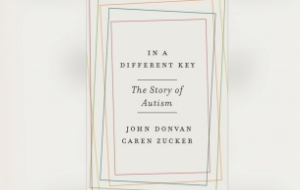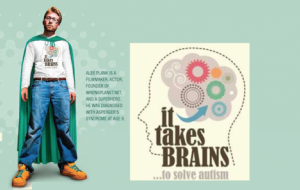Autistic Brains
Planning a family vacation with Autism – 10 tips for success
By Alex Plank on November 2, 2018
 Going on vacation is is supposed to be relaxing but it can often turn out to be the opposite for those on the spectrum if we don’t plan it right. And for parents of autistics, that stress can spread to the whole family. When I was a kid, my parents made a lot of efforts […]
Going on vacation is is supposed to be relaxing but it can often turn out to be the opposite for those on the spectrum if we don’t plan it right. And for parents of autistics, that stress can spread to the whole family. When I was a kid, my parents made a lot of efforts […] Atypical’s 2nd Season is a Step Forward in Autism Representation
By Alex Plank on September 30, 2018
 My criticisms of Atypical’s freshman season were certainly no secret, as I shared my feelings both publicly in various news outlets and privately with Robia Rashid, the show’s creator. At the time, I mentioned that a lot of issues could be fixed, but my biggest problem with season one was the lack of autistic […]
My criticisms of Atypical’s freshman season were certainly no secret, as I shared my feelings both publicly in various news outlets and privately with Robia Rashid, the show’s creator. At the time, I mentioned that a lot of issues could be fixed, but my biggest problem with season one was the lack of autistic […] Before You Look for Work Here Are Four Things You Should Absolutely Know
By John Marble on June 28, 2017
 Our team used to hate conversations like the one below. We really did. “That’s really incredible,” said a well-meaning educator who had called in April about our Autism Advantage program, which runs six-week training cohorts for autistic individuals around specific talent sets. “I’m searching for a program which can teach autistic people acceptable behavior for […]
Our team used to hate conversations like the one below. We really did. “That’s really incredible,” said a well-meaning educator who had called in April about our Autism Advantage program, which runs six-week training cohorts for autistic individuals around specific talent sets. “I’m searching for a program which can teach autistic people acceptable behavior for […] In a Different Key – Interview with John Donvan and Caren Zucker
By Alex Plank on July 20, 2016
 In Autism Talk TV Ep. 26, I speak with authors John Donvan and Caren Zucker about their bestselling book on the history of autism, In a Different Key: The Story of Autism. In addition to being authors, Donvan and Zucker have worked for ABC News, where Donvan is an Emmy award winning correspondent and Zucker […]
In Autism Talk TV Ep. 26, I speak with authors John Donvan and Caren Zucker about their bestselling book on the history of autism, In a Different Key: The Story of Autism. In addition to being authors, Donvan and Zucker have worked for ABC News, where Donvan is an Emmy award winning correspondent and Zucker […] It Takes Brains! – Autism Brain Net
By Alex Plank on November 16, 2015
 When I was first contacted by The Autism Science Foundation about being involved in the It Takes Brains campaign, I honestly didn’t know what to think. The campaign has the goal of urging families and individuals on the spectrum to “make the heroic decision to register for brain tissue donation.” It was certainly one of the […]
When I was first contacted by The Autism Science Foundation about being involved in the It Takes Brains campaign, I honestly didn’t know what to think. The campaign has the goal of urging families and individuals on the spectrum to “make the heroic decision to register for brain tissue donation.” It was certainly one of the […] What’s MSSNG in #Autism? – By John Elder Robison
By Alex Plank on December 10, 2014
 Yesterday a new hashtag campaign appeared in my Twitter feed – #MSSNG. It seemed to refer to autism, and a new research project. I had an immediate reaction, based on my interpretation of the letters in the context of the autism discussion – I thought, Missing? Certainly not. We may be gifted or we may […]
Yesterday a new hashtag campaign appeared in my Twitter feed – #MSSNG. It seemed to refer to autism, and a new research project. I had an immediate reaction, based on my interpretation of the letters in the context of the autism discussion – I thought, Missing? Certainly not. We may be gifted or we may […] Autism Talk TV – Ep. 10 – Transcranial Magnetic Stimulation
By Alex Plank on October 27, 2010
Lindsay discusses the details of TMS and how it relates to Autism. She has been interested in Autism...
Do Autistic Brains Grow At Faster Rates?
By Alex Plank on December 5, 2007
According to a recent study, the size of brain structures in adult autistic brains look very different than those seen in autistic children.Wrong Planet takes an in-depth look at this fascinating scientific paper published in the journal Neuron.
Read on for the exclusive article!
Your Brain’s ‘Love Chemicals’ may also make you Autistic
By Alex Plank on March 12, 2007
Most people with Asperger's Syndrome have some intense interest that they pursue with a passion (I'm one of those) and it's pretty clear that OCD tendencies go hand in hand with Asperger's Syndrome. Serotonin is the chemical that plays a role in causing aspies to pursue their special interests and similarly causes people with OCD to be obsessive or anxious. Certain levels of serotonin are also linked with the autistic tendency of...Brain Activity Related To Processing Faces Is Similar In People With, Without Au
By Alex Plank on November 17, 2005
ScienceDaily.com reports: New brain imaging research at the University of North Carolina at Chapel Hill indicates that when people with autism look at a face, activity in the brain area that responds is similar to that of people without autism. Study suggests that specific behavioral interventions may help people with autism improve their ability to interact socially.


